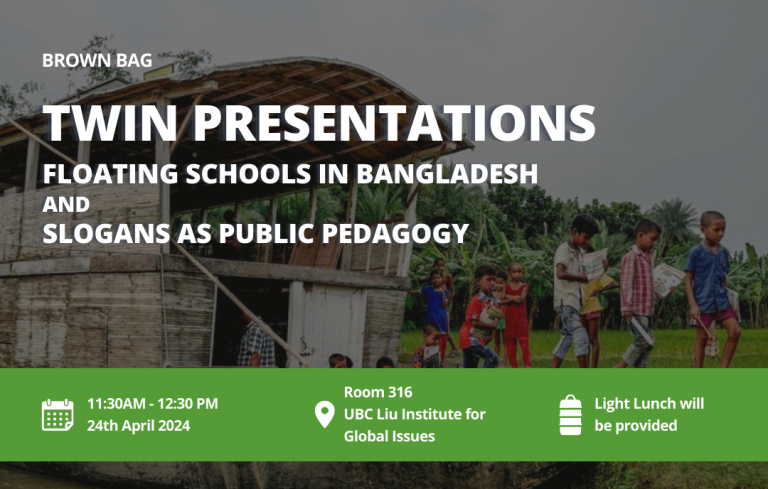
About the Event
As part of the Institute of Asian Research’s Brown Bag series, join us to hear from Mahfida Tahnia and Jafar Iqbal from the The Department of Education Studies (EDST) about their latest research.
Abstracts

Mahfida Tahniat
PhD Student
The Department of Education Studies, UBC
Floating Schools in Bangladesh: A Journey towards Empowerment?
Access to education has become a challenge for one of the most climate vulnerable countries like Bangladesh, and the Floating Schools Program (FSP) might be seen as a powerful way to address educational needs in the ongoing climate crisis context. Even though education is free in Bangladesh, there are significant implications for the delivery of education due to the instances of regular cyclones and floods which destroy school infrastructure, disrupt transport accessibilities, as well as interrupt teaching and learning. During the monsoon seasons, students regularly cannot access the school buildings. The resulting social and economic costs include a wide range of development concerns, from malnutrition and ill health to an increased risk of child trafficking. There are also concerns for school dropouts, child labour and early marriage, particularly for the girls. Against such backdrop, many children in Bangladesh, attend schools in boats, called “Floating School” that literally floats on water, and through which both children and adults can get access to the resources to educate and empower themselves.

Jafar Iqbal
PhD Student
The Department of Education Studies, UBC
Slogans As Public Pedagogy: Bangladeshi Garment Workers’ Cry for Social Justice
Slogans that we see on hand-held signs, bodies, faces, Facebook, or twitter posts are powerful vehicles for public pedagogy. Despite the growing interest in public pedagogy within education, the full potential of slogans, particularly within social movements, remains underexplored. Gerts Biesta’s theorization of “public pedagogy for the public, of the public, and with the public” highlights how slogans can educate and challenge prevailing narratives. My presentation aims to delve into the public pedagogy potentials of slogans in the context of Bangladeshi garment workers’ struggles for social justice. I will examine slogans posted by workers on Facebook and utilized in processions during the wage setting process from April to December 2023, of which I was also part through supporting their cause as part of the normative concerns but not for the purpose of research. However, these slogans, advocating for social justice, equal rights, and fair pay, offer rich insights into the workers plight and the potential for public education. Collected from various labor organization’s official pages, these slogans serve as poignant calls for social justice for those who made our clothes, making us feel comfortable and fashionable. Yet, this research also raises a critical reflection on the responsibilities of researchers in utilizing advocacy materials for academic inquiry.